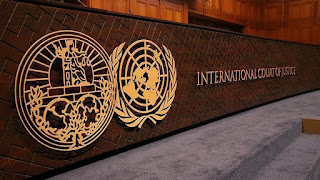The International Court of Justice (ICJ) is the central judicial organ of the United Nations. Besides advising authorised international organizations, UN General Assembly on international law, it also serves as a judicial forum for inter-state disputes. It is to be noted that ICJ is fundamentally different from national courts in many respects due to the sui generis nature of international law itself.

Notably, the ICJ has no compulsory jurisdiction in disputes between the States. The jurisdiction of ICJ is based on the consent of the States, either by special agreement, or by way of a specific treaty which may incorporate a mechanism for the referral of cases to the ICJ. States may accept compulsory jurisdiction by making a declaration under Article 36(2) of ICJ statute. Typically, the Court may entertain two types of cases: legal disputes between States submitted to it by them (which is referred to as contentious cases) and requests for advisory opinions on legal questions referred to it by United Nations organs and specialized agencies (commonly referred as advisory proceedings).
All decisions pronounced by International Court of Justice are binding on parties to the dispute, subject to the fact that they are members of United Nations. Where the states fail to give effect to a judgment rendered by the Court, it entitles the other disputant to have recourse to the United Nations Security Council, which may then decide on the necessary measures to ensure enforcement of the judgement.
Although some researchers maintain that the International Court of Justice has a good track record of enforcing its decisions, however it can be submitted that there has been a major criticism of the Court when it comes to enforcement of judgments against the powerful states. The case of Nicaragua v USA is the best example to position this argument. ICJ in this case, decided against the United States and subsequently the United States withdrew from compulsory jurisdiction of the court.
The decision itself, a scathing indictment of USA’s breaches of Nicaragua’s sovereignty, was left unimplemented until a subsequent government withdrew the case from the Court. The case is also a pertinent example of how ineffective Article 94(2) of the UN Charter can be as a tool of enforcement when powerful disputing States have control over the Security Council.
Delay tactics by States in order to avoid enforcement of ICJ decisions is not uncommon. And this phenomenon is particularly significant in interlocutory decisions of the Court, where the enforcement of which is notoriously rare.
A combination of these factors leads us to conclude that ICJ does not enjoy the authority and power of a court as it is understood in municipal law. However, this impression is not completely correct. Generally, domestic courts often fail to have their judgments enforced when individuals abscond or otherwise resist court judgements and as before the ICJ, powerful individuals are in a better position to execute this position as against the other litigants. Delays too are an age old tactic in unfavourable cases.
We must also bear in mind that the nature of international law, which is founded upon the consent, as sovereign equals, of States. This, together with the impossibility of enforcing court decisions against States by force, makes international law different in nature from domestic law. Therefore, ICJ can be best described as a court that is suited to the precise nature of the law it applies. The enforcement of ICJ decisions can be best achieved only when the parties co-operate and there is a broad consensus amongst the parties to the dispute. In order to meet this end, it is safe to conclude that International Court of Justice is a forum for mediation of state-state disputes, which primarily focuses on a consent based approach to resolve a matter amicably.


